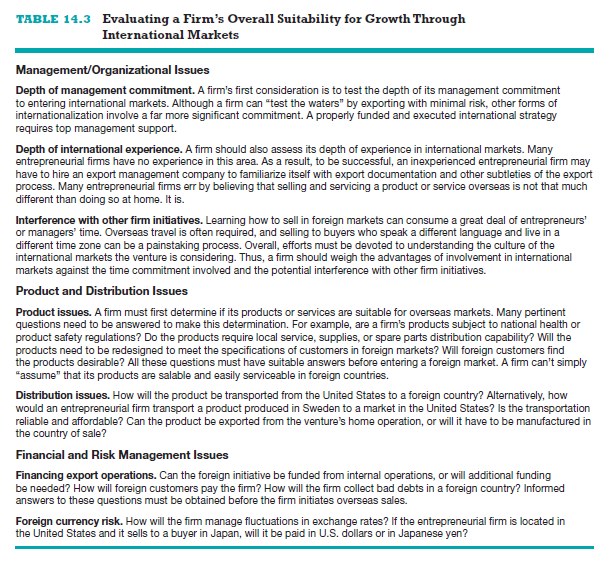International expansion is another common form of growth for entrepreneur- ial firms.9 According to a 2011 survey conducted by the Small Business & Entrepreneurship Council (SBE) and the Financial Services Roundtable, 21 percent of small businesses said that expanding into overseas markets factored into their business plans over the next five years.10 A look at the world’s popu- lation and purchasing power statistics affirms the importance of international markets for growth-oriented firms. Approximately 96 percent of the world’s population and 70 percent of its total purchasing power are located outside the United States. Influenced by these data, an increasing number of the new firms launched in the United States today are international new ventures.
International new ventures are businesses that, from inception, seek to derive competitive advantage by using their resources to sell products or services in multiple countries.11 From the time they are started, these firms, which are sometimes called “global start-ups” or “born globals,” view the world as their marketplace rather than confining themselves to a single country. ASOS, for example, which is a European fashion website, was an international firm from its inception. It now generates over 67 percent of its revenues from overseas sales.12 Similarly, some start-ups become international firms be- cause overseas customers request their product or service. This is what hap- pened to uShip, an Austin, Texas, company, as reported in Case 13.2. Shortly after it launched in 2003, overseas customers started arranging shipments via uShip’s website. uShip is now in 18 countries and has an office in Amsterdam.
Although there is vast potential associated with selling overseas, it is a fairly complex form of firm growth. Of course, alert entrepreneurs should care- fully observe any changes in purchasing power among the world’s societies that may result from a financial crisis like the one the world experienced in
2008 and 2009. Let’s look at the most important issues that entrepreneurial firms should consider in pursuing growth via international expansion.
1. Assessing a firm’s Suitability for Growth through international Markets
Table 14.3 provides a review of the issues that should be considered, includ- ing management/organizational issues, product and distribution issues, and financial and risk management issues, when a venture considers expanding into international markets. If these issues can be addressed successfully, growth through international markets may be an excellent choice for an en- trepreneurial firm. The major impediment in this area is not fully appreciating the challenges involved.

2. Foreign Market entry Strategies
The majority of entrepreneurial firms first enter foreign markets as exporters, but firms also use licensing, joint ventures, franchising, turnkey projects, and wholly owned subsidiaries to start international expansion.13 These strategies, along with their primary advantages and disadvantages, are explained in Table 14.4.
3. Selling overseas
Many entrepreneurial firms first start selling overseas by responding to an unsolicited inquiry from a foreign buyer. It is important to handle the inquiry appropriately and to observe protocols when trying to serve the needs of customers in foreign markets. The following are several rules of thumb for sell- ing products in foreign markets:

■ Answer requests promptly and clearly. Do not ignore a request just because it lacks grammatical clarity and elegance. Individuals using a nonnative language to contact a business located outside their home nation often are inexperienced with a second language.
■ Replies to foreign inquires, other than e-mail or fax, should be communi- cated through some form of airmail or overnight delivery. Ground delivery is slow in some areas of the world.
■ A file should be set up to retain copies of all foreign inquiries. Even if an inquiry does not lead to an immediate sale, the names of firms that have made inquiries will be valuable for future prospecting.
■ Keep promises. The biggest complaint from foreign buyers about U.S. businesses is failure to ship on time (or as promised). The first order is the most important in that it sets the tone for the ongoing relationship.
■ All correspondence should be personally signed. Form letters are offensive in some cultures.
■ Be polite, courteous, friendly, and respectful. This is simple common sense, but politeness is particularly important in some Asian cultures. In addition, avoid the use of business slang that is indigenous to the United States, in that the slang terms lack meaning in many other cultures. Stated simply, be sensitive to cultural norms and expectations.
■ For a personal meeting, always make sure to send an individual who is
of equal rank to the person with whom he or she will be meeting. In some cultures, it would be seen as inappropriate for a salesperson from a U.S. company to meet with the vice president or president of a foreign firm.
Source: Barringer Bruce R, Ireland R Duane (2015), Entrepreneurship: successfully launching new ventures, Pearson; 5th edition.

Merely a smiling visitor here to share the love (:, btw outstanding design.
I really enjoy examining on this website , it contains good articles.